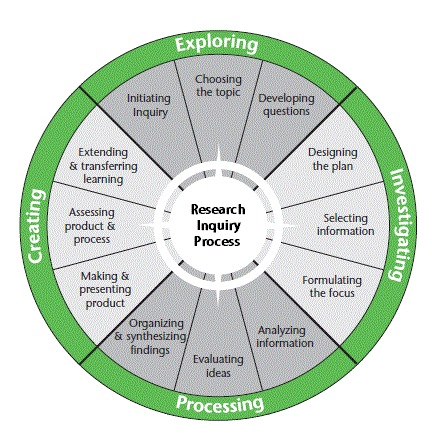Research and Inquiry

Exploring
During Step One of the research process, you will:
- Explore possible ideas
- Choose an appropriate and personally engaging topic
- Develop deep questions around the topic chosen
Things to Remember:
- Start with what you know about the topic, and use this as a starting point for developing deeper research questions.
- Explore many resources and ideas before settling on your topic.
- The best place to start your exploration is with factual reference sources, in print and online.
- Setting up a research portfolio will help you to organize your work.
Resources:
Investigating
During Step Two of the research process, you will:
- Design a research plan
- Find primary and secondary sources and select appropriate information
- Use effective search strategies
- Evaluate Google search websites
- Skim and scan sources
- Develop key search terms
Things to Remember:
- This is the stage where you need to narrow the focus of your research and explore resources and ideas more deeply.
- Familiarize yourself with the range of relevant resources available to you in the school library and beyond.
- Developing a variety of search strategies will help you find deeper information.
Resources:
Processing
During Step Three of the research process, you will:
- Analyze your information
- Evaluate your ideas and those from selected information
- Organize and synthesize your findings by taking notes and drafting an outline
Things to Remember:
- Taking good notes is essential to good research.
- Be accountable for the information you gathered by keeping track of your sources.
- Answering your research questions is key: sort through the information that you’ve gathered and decide what is key.
- Your research will have introduced you to multiple perspectives on the issues you are examining: consider these other ideas yas you formulate your own.
- Critical thinking and analysis is what research is all about: consider what perspective you can add to the issues you are studying.
Resources:
Creating
During Step Four of the research process, you will:
- Put together the culminating product that presents the results of your research.
- Present your findings to a larger audience.
- Reflect upon your product and the process used to construct it.
- Extend and transfer your learning to new contexts and inquiries.
Things to Remember:
- There are many ways to communicate your findings: match your strategy to your purpose and your audience.
- Think about how to communicate effectively in your chosen medium: words work well on a page, images work well on a screen.
- Knowing your topic thoroughly is the best way to prepare effectively for communicating your findings.
Resources:
